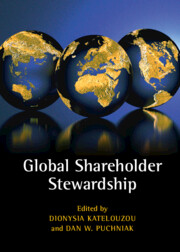In Global Shareholder Stewardship, editors Dionysia Katelouzou and Dan W. Puchniak bring together contributors to explore the complex state of global shareholder stewardship and its future prospects. This extensive collection is invaluable given the current cultural transformations to corporate governance, writes Irina Bevza.
Global Shareholder Stewardship. Dionysia Katelouzou and Dan W. Puchniak (eds). Cambridge University Press. 2022.
Find this book (affiliate link):![]()
 Global Shareholder Stewardship, edited by Dionysia Katelouzou and Dan W. Puchniak, provides an in-depth analysis of the shareholder engagement framework at international and regional levels. The book explains the complex state of global shareholder stewardship and discusses its prospects.
Global Shareholder Stewardship, edited by Dionysia Katelouzou and Dan W. Puchniak, provides an in-depth analysis of the shareholder engagement framework at international and regional levels. The book explains the complex state of global shareholder stewardship and discusses its prospects.
Shareholder stewardship largely refers to how institutional investors manage capital to generate long-term value for beneficiaries and other stakeholders. Shareholder stewardship saw a rise in the aftermath of the 2008 global financial crisis after the UK released the world’s first stewardship code in 2010. This defined stewardship as ‘the responsible allocation, management and oversight of capital to create long-term value for clients and beneficiaries leading to sustainable benefits for the economy, the environment and society’. However, in Global Shareholder Stewardship, Katelouzou and Puchniak dissuade readers from the idea that the shareholder stewardship codes that followed at international and regional levels adopted the philosophy of the UK code.
In fact, due to region and jurisdiction-specific factors, global stewardship is far more complex than it appears. Moreover, it serves various functions ‘which would have never been anticipated by the original drafter of the UK Stewardship Code’ (5). For example, government bodies might develop stewardship codes to demonstrate their jurisdiction adheres to global norms of good corporate governance. At the same time, institutional investors might create a code to promote self-regulation and avoid being regulated by the government.
A more notable difference, however, is the lax enforcement of stewardship codes globally: none of the jurisdictions that have adopted a UK-style code has followed the UK’s model of enforcement. In contrast, stewardship codes were made voluntary in scope. One stark example is Kenya, where a government-issued stewardship code has zero signatories, as discussed in the chapter by Austin Ouko.

Image Credit: Image by mohamed Hassan from Pixabay
The collection’s empirical research presents mixed evidence of the impact of stewardship engagement by institutional investors on corporate performance. Moreover, in the chapter ‘Investment Management, Stewardship and Corporate Governance Roles’, Roger J. Barker and Iris H.-Y. Chiu suggest that ‘the reliance of shareholders ‘‘to do the right thing’’ in monitoring the corporate economy for the common good is […] a lofty ambition, and one that institutional investors have not quite lived up to, and may not be well placed to fulfil’ (530).
The UK Stewardship Code (revised in 2020) and the Shareholders Rights Directive (EU) 2017/828 require that the investment management industry engages in corporate governance as part of good stewardship. However, business incentives and existing business models can impact the effectiveness of their engagement. Existing literature offers a variety of reasons why investment managers might be disincentivised from investing resources in stewardship. These reasons include excessive trading of securities in the portfolio to generate transaction charges by active investment strategies (where a portfolio manager runs a more concentrated portfolio and targets to outperform the benchmark market index); and disengagement from the real economy in passive strategies (where a portfolio manager tracks the benchmark market index).
Moreover, some fund beneficiaries might not be interested in the long-term wellbeing of investee companies either. For instance, defined benefit pension funds have defined liabilities and will target liability-driven strategies that might be short-termist and not adhere to a long-term good stewardship perspective. However, Barker and Chiu point out that UK and EU regulators only began to grapple with numerous obstacles to investment management’s productive engagement with investee companies to improve corporate governance. Nevertheless, they stress that ‘perhaps ‘‘stewardship’’ can be the starting point for cultural adjustment on the part of the investment management industry as it considers how its structures, incentives, business models and governance affect the ultimate saver’ (548).
In the UK, the government contributes to pension investments through provision of a tax credit, which makes it a significant financial investor in the market. In ‘The Market for Stewardship and the Role of the Government’, Katelouzou and Eve Micheler suggest that the UK government should tailor tax credits to investments that are stewardship active. The UK government oversees financial service providers and is a significant economic contributor to the financial services industry – pension schemes represent 90 per cent of revenues of investment consultants and fiduciary managers. So, if the government makes a financial contribution to investment, it is entitled to know how investment and stewardship decisions for pensions are taken. The authors conclude: ‘like all other beneficiaries of and contributors to the market, the government should act as a steward in relation to its own investment’ (87).
The environmental, social and governance (ESG) trend has gathered political attention and become embedded in business models for an increasing number of institutional investors. Katelouzou and Puchniak note that a focus on ESG considerations in investment management has motivated the adoption of stewardship codes. However, there has been lax enforcement, along with a regulatory design that assumes that institutional shareholders hold the majority of shares across listed companies (while most of the institutional investors are minority shareholders). They conclude that these ‘undercut the ability [of shareholder stewardship] to solve most firm-specific or systematic corporate governance problems in most jurisdictions around the world. However, the rise of ESG as a recent focal point of stewardship appears to present a hopeful possibility for its future’ (36).
Since 2010, policymakers, private-standard setters, corporate stakeholders and institutional investors have increasingly adopted the shareholder stewardship concept and embedded it in their practices. Yet, as this book demonstrates, the development of global stewardship has proved to be much more complicated than anticipated. Katelouzou and Puchniak have given readers a collection that explores previously unknown complexities of the global stewardship movement. This extensive work will be invaluable amid the cultural transformation that the corporate governance field is undergoing.
- This review first appeared at LSE Review of Books.
Please read our comments policy before commenting.
Note: This article gives the views of the author, and not the position of USAPP – American Politics and Policy, nor of the London School of Economics.
Shortened URL for this post: https://bit.ly/3RcbBJL
About the reviewer
Irina Bevza – Trinity College Dublin
Irina Bevza is a PhD candidate at Trinity College Dublin. Her research interests include corporate governance, finance and portfolio management. She has been working in the investment industry for almost ten years. She also holds a Chartered Financial Analyst designation and chairs a member value committee at the CFA Ireland society.






